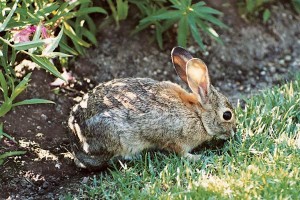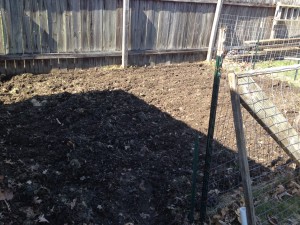How To Keep Rabbits And Groundhogs Out Of Garden

In areas where development of land is driving wild animals into the suburbs, deer, rabbits and groundhogs quickly become garden pests. And if you live outside of town, it's common for wildlife to graze in your garden.
In order to stop wildlife from consuming your tomatoes before you get to pick them, or before your rows of sweet corn are devoured by deer reaching up the stalks, consider your options for deterring a number of wild animals.
Deer

You can identify damage done by a deer by jagged or torn twigs and stems.
Ohio State University Extension School of Natural Resources says that the deer management option you choose will not change your wildlife problems overnight; instead, you will see changes in deer behavior over time. OSU Extension offers several suggestions for keeping deer away from your garden.
If deer are a new problem in your garden, you can employ scare tactics, like gas exploders, pyrotechnics, spotlights, gunfire, shell crackers or fireworks. This probably won't work if deer are used to your area, though. Another tactic used is placing bags of human hair around the area you don't want deer to bother, but this strategy doesn't have consistent results. Tying a bar of soap to a tree is another method and should protect one square meter of area around the tree. Penn State Extension's list of deer-resistant plants is a good starting point for developing a plan for keeping deer out of your vegetables and flowers.
Depending on the amount of money you can spend, fences are one way to keep deer out of your garden. Consider putting up a temporary electric fence or a wire fence to fend off deer. University of Minnesota Extension suggests installing a 6 foot tall wire fence angled away from the yard and garden. The height and angle of the fence will discourage deer from jumping over it, as they will fear becoming entangled in it. Keep in mind that an 8 foot tall vertical fence can be jumped by a deer. If you choose to install an electric fence, put a small amount of peanut butter on strips of aluminum foil and attach to the fence when the electric is turned off. The deer will be shocked when they lick the peanut butter.
Repellents are yet another option, but they tend to be expensive, and there aren't any that are registered. According to OSU Extension, contact repellents can be applied directly to plants; this will cause the plants to taste bad to deer. Area repellents are applied around plants; their odor discourages deer from eating plants.
Rabbits
 If you notice clean cuts on leaves or stems, it's probably a rabbit that's feeding in your garden. The University of Georgia Cooperative Extension offers a list of methods that can be employed to keep rabbits away from your garden, including using plastic snakes and owls to scare away rabbits.
If you notice clean cuts on leaves or stems, it's probably a rabbit that's feeding in your garden. The University of Georgia Cooperative Extension offers a list of methods that can be employed to keep rabbits away from your garden, including using plastic snakes and owls to scare away rabbits.
Chicken wire with mesh of less than 1 inch can be placed around your garden. The chicken wire must be buried at least 3 inches in the ground and must reach at least 2 feet above the ground in order to be effective.
There are a number of methods, such as human hair, used kitty litter, and limestone or cayenne pepper that can be placed around your garden's perimeter. Rabbits have excellent senses of smell and taste, so they'll be less likely to venture into your garden if they smell or taste something that is unpleasant to them.
Groundhogs
 Fences that are at least 3 foot high are normally effective when trying to keep groundhogs out of your garden. University of Vermont Extension reminds gardeners that groundhogs dig tunnels, so the fencing needs to be buried several inches in the ground. Repellents can be used, as well as oily substances at the entrances to their burrows.
Fences that are at least 3 foot high are normally effective when trying to keep groundhogs out of your garden. University of Vermont Extension reminds gardeners that groundhogs dig tunnels, so the fencing needs to be buried several inches in the ground. Repellents can be used, as well as oily substances at the entrances to their burrows.
Trapping groundhogs may be the best option, or poisoning them by placing a poison gas cartridge in their burrows.
Raccoons
Raccoons can be a nuisance in the garden, too. OSU Extension recommends removing food sources and water supplies, modifying and reducing access to the habitat and trapping or using lethal control to remedy raccoon problems on your property.
Electric fences can be successful at keeping raccoons out of your plants; turn the electric on at dusk and turn it off in the morning. You can also use reinforced filament tape with glass yarn filaments to attach corn to the stalk. This will prevent raccoons from damaging the corn plants.
Scare tactics like loud radios, dogs, bright lights, aluminum pans and plastic streamers can be used, but they might not be effective. There aren't any repellents for raccoons, so the only other ethical option is trapping them, if local and state policies allow for it.
Chipmunks
Chipmunks will occasionally dig up seeds that have been planted and they might also uproot seedlings. University of Vermont Extension suggests deterring chipmunks by spraying bulbs with repellent, or placing jagged shells or stones in holes when you plant bulbs.
Using plant cages will make it more difficult for chipmunks to get to the plants growing in your garden.
Have any other tips for keeping wildlife out of your garden? Let us know in the comments below.
4 more posts about garden pests:
- How to control groundhogs
- How to keep pests out of your garden
- Fencing ideal for averting garden pests
- Fact and folklore: Ways to keep pests from gardens
STAY INFORMED. SIGN UP!
Up-to-date agriculture news in your inbox!
How To Keep Rabbits And Groundhogs Out Of Garden
Source: https://www.farmanddairy.com/top-stories/how-to-keep-wildlife-out-of-your-garden/252323.html
Posted by: haassobsell.blogspot.com

0 Response to "How To Keep Rabbits And Groundhogs Out Of Garden"
Post a Comment